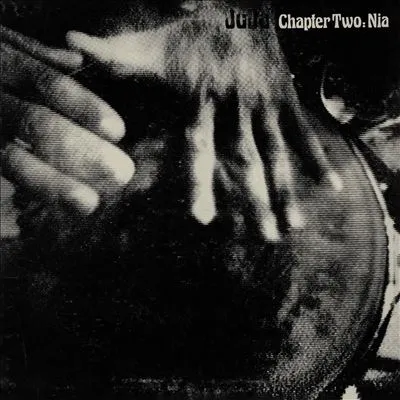- LP
- Recommended =
- New Release
Juju
Chapter Two: Nia
Strut Records
- Cat No: STRUT245LP
- updated:2024-11-06
アフロジャズ代表的存在ONENESS OF JUJUの前進ジャズバンドJUJU 、スピリチュアル・ジャズ名門レーベル〈STRATA RECORDS〉より1974年にリリースされた名盤、CHAPTER TWO: NIAが新たに復刻版として登場!!スピリチュアル・ジャズ・サックスの巨人PHAROAH SANDERSの名曲「BLACK UNITY」フリーフォーム、カヴァーなどを収録。モダン緊張感のある漆黒の前衛スピリチュアル・ジャズ作品。
Track List
Strut presents a brand new reissue of Juju’s powerful Afrocentric album ‘Chapter Two: Nia’ from 1974, originally released on Strata East.
Juju formed in San Francisco and moved to New York in July 1972. "We were avant-garde artists and revolutionary agents for change," explains bandleader James “Plunky” Branch. "We played venues like Slugs, the East, and Ornette Coleman’s loft on Prince Street; we also met and hung out with the greats, from Pharoah Sanders to John Gilmore.
"By 1974, Plunky and the band had relocated to Richmond, Virginia. "New York’s cost of living was high, and I thought Richmond could be a fresh creative environment. We stayed in the home of my oldest and best friend, which we dubbed the Juju Raga Artist House. We lived upstairs and converted the downstairs into the first black arts gallery and performance space in the state." In June 1974, Juju recorded their second album for Strata-East, Chapter Two: Nia, at Eastern Recording Studios in Richmond. "The music was Afrocentric," continues Plunky, "and we included black nationalistic poetry written and spoken by Ngoma Ya Uhuru, a high school friend who had spent time with Amiri Baraka’s Spirit House." The album also featured a remarkable freeform cover of Pharoah Sanders’ classic ‘Black Unity.’
Juju became the local Virginia exponents of progressive ideas that were being expressed nationally and internationally, attracting a small, active group of artists and supporters. However, being in the South, Richmond's black music audience leaned towards blues, gospel, and soul. After much consideration, Juju decided to incorporate trap drums and a backbeat, blending these rhythms with electric sounds, and rebranded as Oneness Of Juju. With a new lineup and renewed energy, the band began a new chapter, releasing their classic African Rhythms album a year later.
This new reissue of Juju’s ‘Chapter Two: Nia’ includes the full original artwork, featuring cover art adapted from a concert video still by Collis Davis. Remastered from the original tapes by The Carvery, this Strut release also includes brand new liner notes by bandleader James “Plunky” Branchv
Juju formed in San Francisco and moved to New York in July 1972. "We were avant-garde artists and revolutionary agents for change," explains bandleader James “Plunky” Branch. "We played venues like Slugs, the East, and Ornette Coleman’s loft on Prince Street; we also met and hung out with the greats, from Pharoah Sanders to John Gilmore.
"By 1974, Plunky and the band had relocated to Richmond, Virginia. "New York’s cost of living was high, and I thought Richmond could be a fresh creative environment. We stayed in the home of my oldest and best friend, which we dubbed the Juju Raga Artist House. We lived upstairs and converted the downstairs into the first black arts gallery and performance space in the state." In June 1974, Juju recorded their second album for Strata-East, Chapter Two: Nia, at Eastern Recording Studios in Richmond. "The music was Afrocentric," continues Plunky, "and we included black nationalistic poetry written and spoken by Ngoma Ya Uhuru, a high school friend who had spent time with Amiri Baraka’s Spirit House." The album also featured a remarkable freeform cover of Pharoah Sanders’ classic ‘Black Unity.’
Juju became the local Virginia exponents of progressive ideas that were being expressed nationally and internationally, attracting a small, active group of artists and supporters. However, being in the South, Richmond's black music audience leaned towards blues, gospel, and soul. After much consideration, Juju decided to incorporate trap drums and a backbeat, blending these rhythms with electric sounds, and rebranded as Oneness Of Juju. With a new lineup and renewed energy, the band began a new chapter, releasing their classic African Rhythms album a year later.
This new reissue of Juju’s ‘Chapter Two: Nia’ includes the full original artwork, featuring cover art adapted from a concert video still by Collis Davis. Remastered from the original tapes by The Carvery, this Strut release also includes brand new liner notes by bandleader James “Plunky” Branchv




スラッグス、イースト、プリンス・ストリートのオーネット・コールマンのロフトといった場所で演奏された今作。黒人音楽の聴衆がブルース、ゴスペル、ソウルに傾いていた頃、前衛リズムとエレクトリック・サウンドを融合させることを探究したスピリチュアルな背景も美しい。 (hamon)